“EDINA – Energy-efficient development of special revitalisation zones and urban areas” (Summary of the three-Day Workshop Serie)
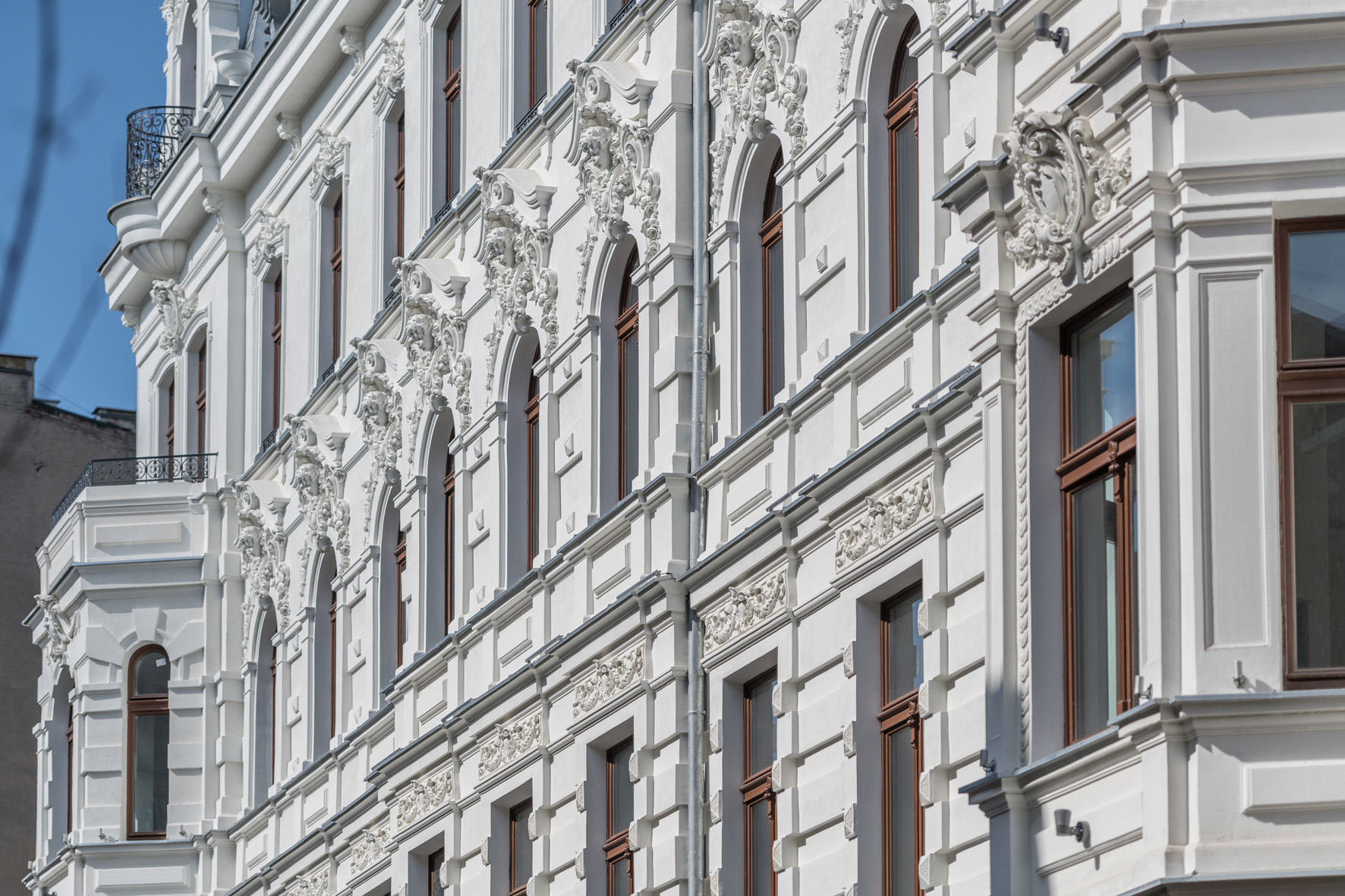
Summary of the three-Day Workshop Serie:
- Kick-Off Workshop (12th February 2021)
- Workshop – Focus: Solutions for urban revitalisation area (26th February 2021)
- Workshop – Focus: Improvement of energy efficiency of buildings (12th March 2021)
The workshop was part of project “EDINA – Energy-efficient development of special revitalisation zones and urban areas” implemented with two partners: Energy Conservation Foundation (FPE) and Housing Initiative for Eastern Europe (IWO e.V.). The project leader is the Institute of Urban and Regional Development.
The project is part of the European Climate Initiative (EUKI) acting on behalf of the Federal Ministry for Economic Affairs and Climate Action (BMWK). The main goal of EUKI is to support climate cooperation in the European Union (EU) to reduce greenhouse gas emissions.

- Kick-Off Workshop (12th February 2021)
The workshop was attended by the representatives of Polish cities with the Special Revitalisation Zones (SRZs), in particular the representatives of the cities of Płock, Włocławek, Bytom, Łódź, as well as the Sendzimir Foundation, Ministry of Climate and Environment, Ministry of Development Funds and Regional Policy, National URBACT Point, Institute of Urban and Regional Development (IRMiR), Energy Conservation Foundation (FPE), including the FPE energy efficiency expert: Jerzy Kwiatkowski, Housing Initiative for Eastern Europe (IWO e.V.), including experts from Insar – urban office which is attending to conceptual and planning duties for municipalities, regions, public and private organisations.
In the first part of the workshop, the objectives of the Long-Term Renovation Strategy as well as the EDINA partners and planned activities within the project were presented.
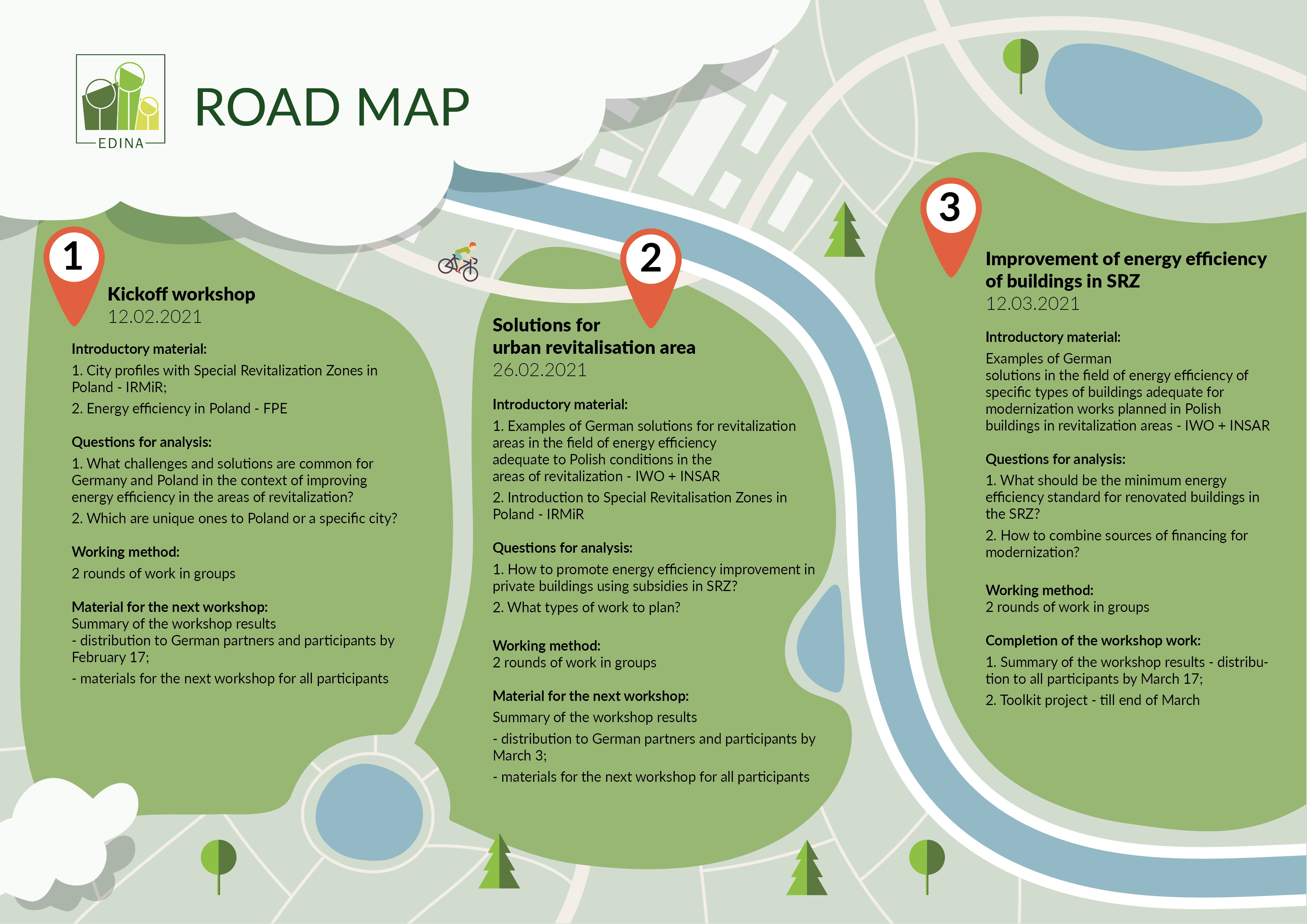
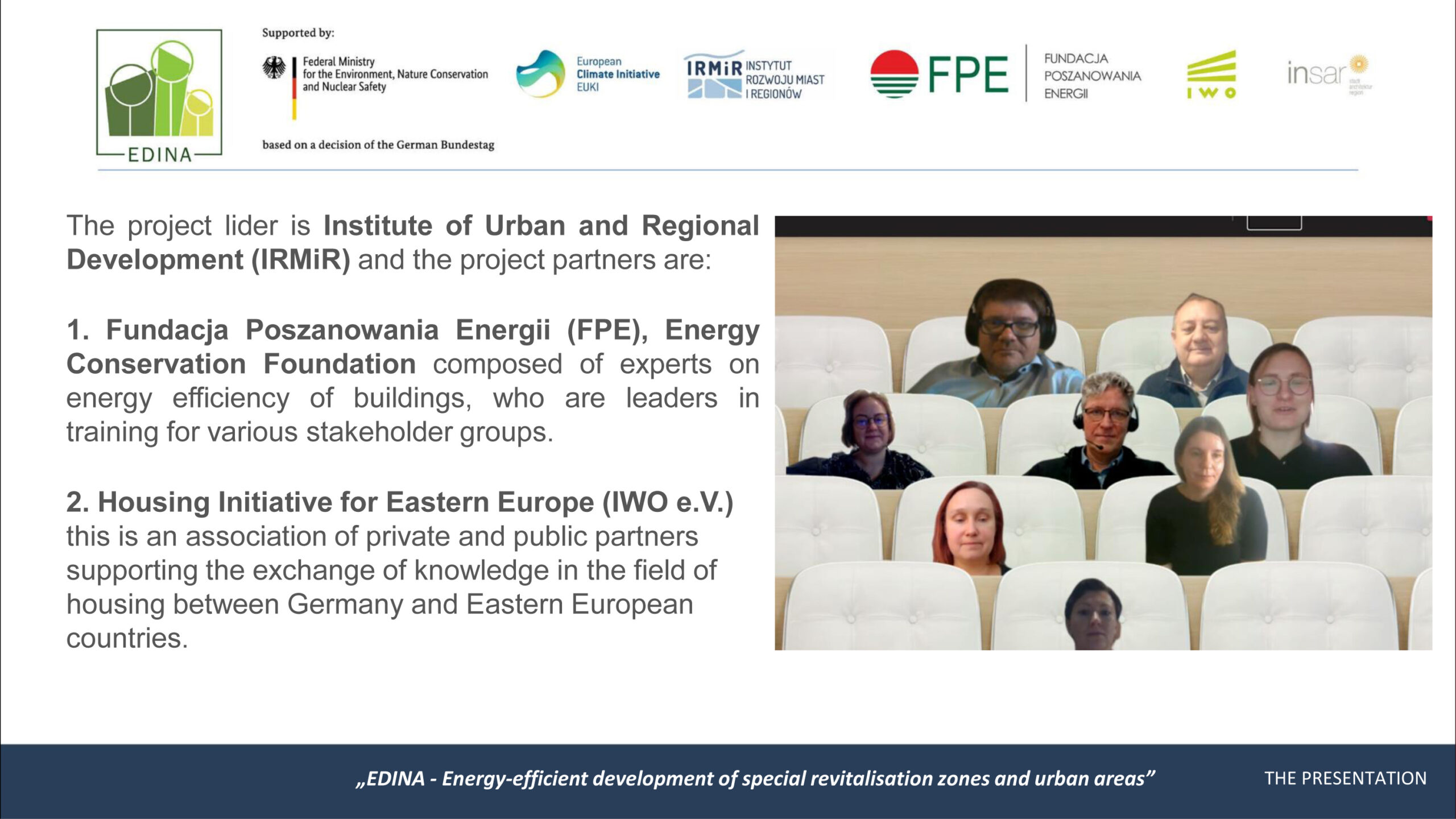
In the next part of the workshop, focused on the International Perspective, Berlin experts from the INSAR presented examples of solutions and challenges related to the improvement of energy efficiency in urban areas in Germany:
- Integrated perspective of energy efficiency
- Challenges of energy efficient refurbishment of urban areas


Then the energy efficiency expert from the Energy Conservation Foundation shared his knowledge on the local context of energy efficiency improvement in Poland.

The last part was the workshop was conducted with the participation of the cities with the SRZs as well as the representatives of the foundations dealing with energy efficiency (FPE, Sendzimir) and the Ministry of Development Funds and Regional Policy. It was devoted to good practices related to energy efficiency in Germany and Poland, consisting of two rounds:
- What challenges and solutions are common for Germany and Poland in the context of improving energy efficiency in the revitalisation areas?
- Unique solutions in the Polish revitalisation areas – What solutions, in the context of improving energy efficiency in revitalisation areas, could inspire other Polish cities?
Please find here (https://edina.irmir.pl/summary-of-the-february-12-workshop/) Summary of the 12th February workshop entitled “Exchange of experiences: What kind of inspiration do Polish cities need to accelerate the process of improving energy efficiency in their areas of revitalisation”?
2. Workshop – Focus: Solutions for urban revitalisation area (26th February 2021)
The Workshop was attended by the representatives of the cities with the SRZs (Płock, Włocławek, Kalisz, Łódź, Bytom, Opole Lubelskie), as well as the representatives of a foundation dealing with energy efficiency (FPE), Ministry of Climate, National URBACT Point, Institute of Urban and Regional Development (IRMiR), Energy Conservation Foundation (FPE), Housing Initiative for Eastern Europe (IWO e.V.,) including experts from Insar – urban office which is attending to conceptual and planning duties for municipalities, regions, public and private organisations, Dr. Kay Pöhler from KfW Bank, which is one of the world’s leading promotional banks. The KfW has been committed to improving economic, social and environmental living conditions across the globe on behalf of the Federal Republic of Germany and the federal states.
In the first part of the workshop, focused on the International Perspective, experts from the INSAR presented various design solutions for different districts of the German cities taking into account the following issues:
- Rehabilitation of historic squares (marketplaces)
- Rehabilitation of riverfronts in historic cities
- Climate adaption and heritage conservation: Blue and green infrastructure in historic districts
- From traffic infrastructure to mobility: Facilitation of changes in mobility planning
- Challenges and formats for communication and participation in urban revitalisation processes
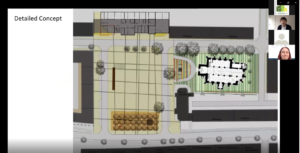

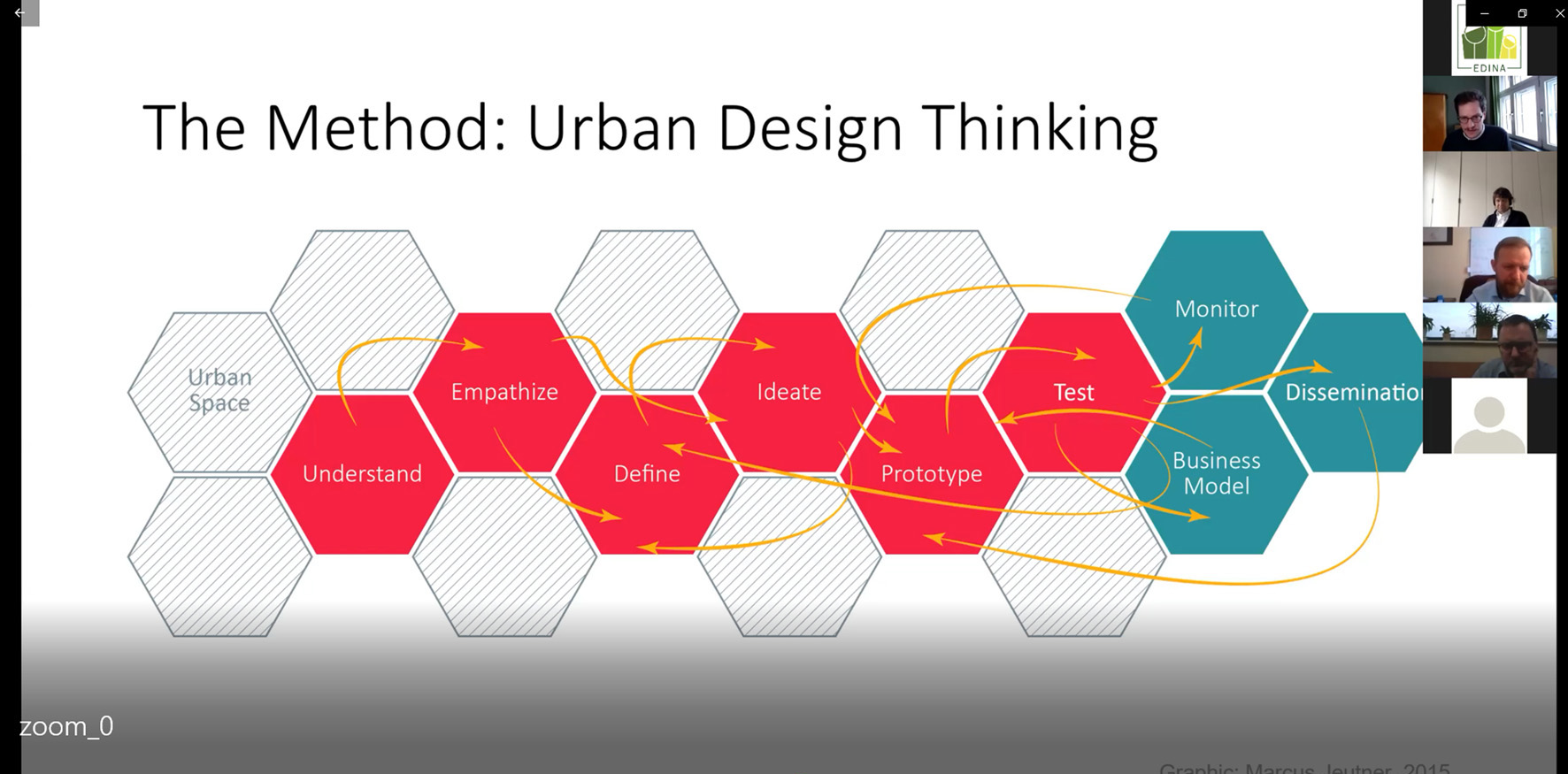
Meanwhile, the representatives of Polish cities (Włocławek, Opole lubelskie, Płock, Bytom) presented design solutions within their Special Revitalisation Zones.


In the next part of the workshop Dr. Kay Pöhler from KfW Bank presented German experiences in financing energy-efficient revitalisation of urban areas.
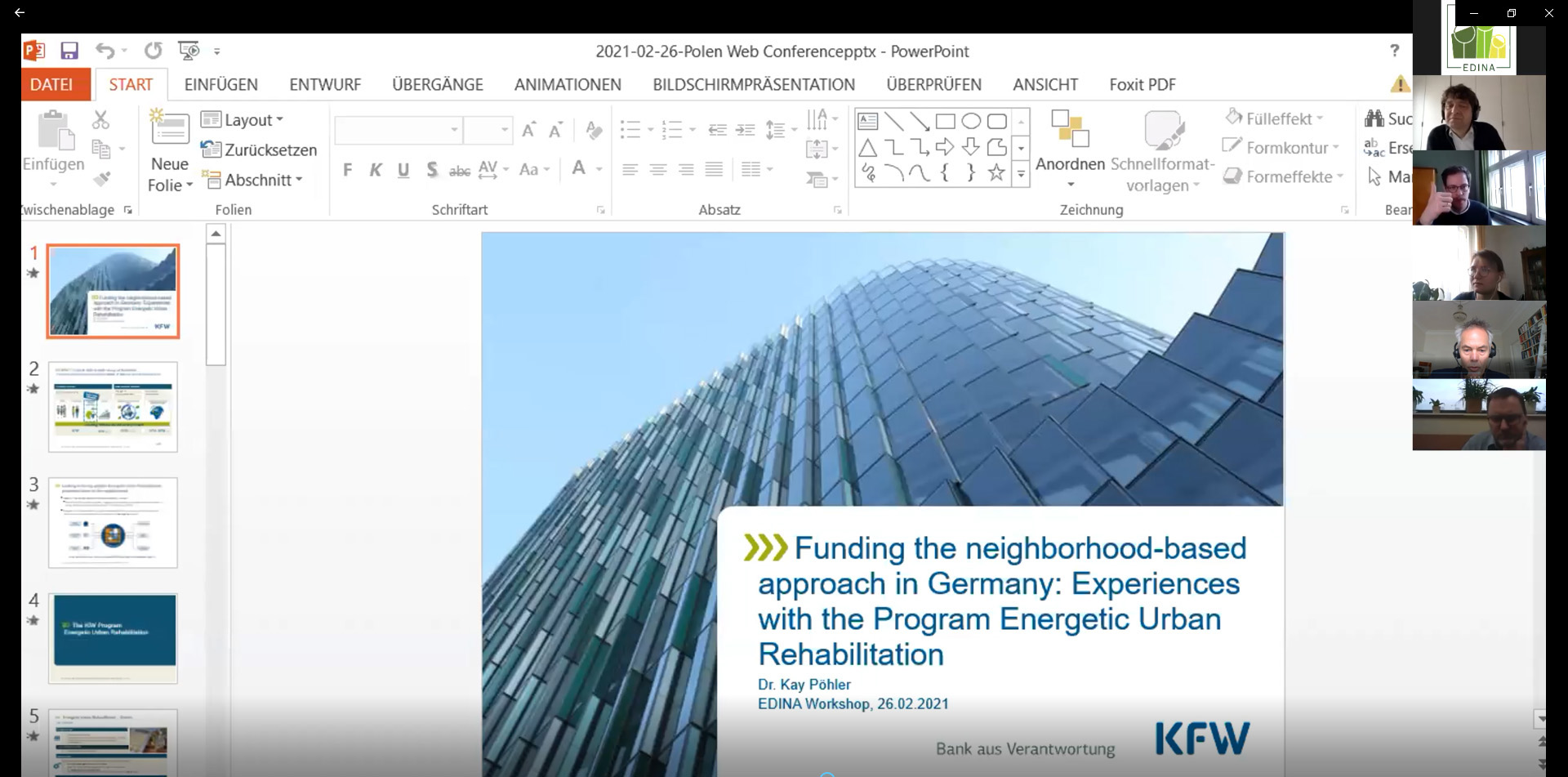
The last part was the workshop was conducted with the participation of the cities with the SRZs (Płock, Włocławek, Kalisz, Łódź, Bytom, Opole Lubelskie), as well as the representatives of the FPE, foundation dealing with energy efficiency (FPE) and the Ministry of Climate. It was devoted to good practices related to energy efficiency in the SRZs and consisted of two rounds:
- How to define the rules for granting subsidies to promote private refurbishments in the Special Revitalisation Zones?
- How to define the rules for granting subsidies to promote the improvement of energy efficiency of refurbished buildings in the Special Revitalisation Zones?
Please find here (https://edina.irmir.pl/summary-of-the-26-february/) Summary of the 26th February workshop: “Toolkit: What do cities with the Special Revitalisation Zones advise other cities in Poland where SRZs is still being planned?”
3. Workshop – Focus: Improvement of energy efficiency of buildings (12th March 2021)
The workshop was attended by the representatives of Polish cities with the Special Revitalisation Zones (SRZs), in particular the representatives of the cities of Kalisz, Płock, Włocławek, Bytom, Łódź, Kalisz, as well as the Sendzimir Foundation, National URBACT Point, Institute of Urban and Regional Development (IRMiR), Energy Conservation Foundation (FPE), including the FPE energy efficiency experts: dr inż. Joanna Rucińska and dr inż. Jerzy Kwiatkowski, as well as the Veolia expert, Marcin Kwiatos, Head of the Analysis and Technology Department, Veolia Energia Łódź.
In the summary of the previous meetings, the following agreements were emphasised:
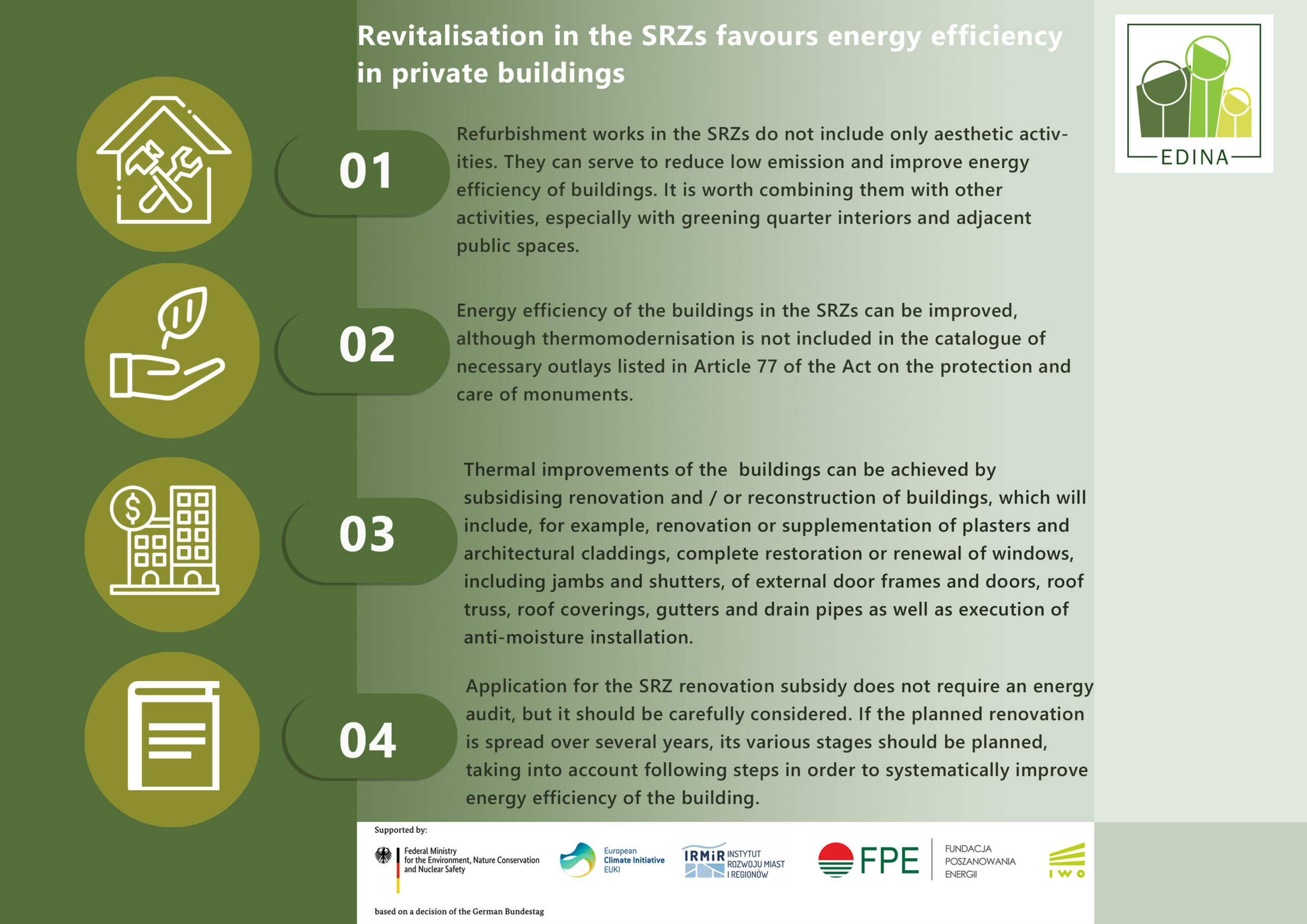
The workshop consisted of three parts.
In the first part, Joanna Rucińska presented a lecture entitled “Energy efficiency”, in which she discussed the basic issues related to energy efficiency, from the energy performance of an existing building to comprehensive modernisation using various energy sources with the participation of many stakeholders, based on the Polish examples.
Then, as part of an open discussion, the benefits of increasing energy efficiency of a building, especially for its end-user, were discussed, as well as various possibilities of co-financing modernisation of existing buildings, and combining these sources with subsidies possible in the Special Revitalisation Zones.
In the next part of the meeting, there was a presentation by Marcin Kwiatos, Head of the Analysis and Technology Department in Veolia Energia Łódź, whose heating system is based on biomass and the use of intelligent solutions. The Veolia company supports residents and housing communities in reducing heat consumption in the revitalisation areas in Łódź. Mr. Kwiatos presented examples of the Veolia projects that included development of concepts and heating networks to be connected to public and residential buildings situated in the historic districts of Łódź.
Then, in the introduction to the last part of the workshop, Jerzy Kwiatkowski presented examples of criteria and evaluation of the energy efficiency improvement of buildings in terms of safety, energy efficiency, innovation and functionality.
Afterwards two rounds of workshops took place:
1st round: What should be the minimum energy requirements for each project carried out within the Special Revitalisation Zones? How should the bonuses for additional energy efficiency solutions in refurbished buildings be defined?
2nd round: How to combine different sources of co-financing renovations improving energy efficiency in buildings in the SRZs?
Summarising both rounds, it was found that using criteria that would not refer in detail to specific solutions such as entry thresholds or check-lists would be beneficial for raising the investor’s awareness regarding new available solutions for improving energy efficiency of the building and environment. It was also proposed to create such a tool to help cities that provide subsidies in the SRZs. It was also emphasised that in an integrated approach to renovation the staging of works is important. That could be achieved through energy passports in a form of a guide on how to increase energy efficiency of a building step by step, by increasing its energy class, and how to define the minimum requirements at individual stages of works.
The planned works could also be associated with a catalogue of possible sources of funding, including, for example, the programme “Czyste Powietrze” (Clean Air) and subsidies such as Stop Smog or Ulga termomodernizacyjna [Thermomodernisation relief] developed under this programme. Consulting centres would be very useful in such type of activities, as they could provide information about possible financial support for the works at respective stages of the building modernisation.
It is worth improving comprehensively the technical parameters of a building, adapting it to local conditions and strategic goals of cities.
The creation of a catalogue of activities along with the indication of available financial sources was proposed. The catalogue categories would include:
- Basic renovation works,
- Additional modernisation works,
- Energy sources,
- Building surroundings.
The workshop ended a series of meetings conducted in accordance with the roadmap below:

Thank you all so very much for your participation and support during the Workshop series!
More information about the EDINA project you can find here: https://edina.irmir.pl/en/
